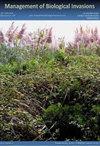为海洋依赖地区的非本地物种制定生物安全计划:立法、风险管理和利益相关者参与的作用
IF 1.2
4区 环境科学与生态学
Q3 BIODIVERSITY CONSERVATION
引用次数: 3
摘要
海洋贸易和相关活动的快速增长导致全球范围内非本地物种(NNS)的数量不断增加。NNS一旦建立,可通过人类活动进一步传播。NNS的传播是一项跨界挑战,必须通过在国际和地方范围内实施的一系列管理措施来应对。相比之下,引进新航道后的管理责任往往落在港口和码头等地方管辖区域内工作的海事管理人员身上。在这里,我们研究立法框架,风险管理和感知如何影响在近海,半自治岛屿社区制定和实施生物安全规划的能力;设得兰群岛。我们通过将风险管理方法整合到更广泛的海洋空间规划管理过程中,提出了一种全面的生物安全管理方法。在全球、泛欧、国家和地方管理措施(例如条例、条约和政策)的背景下评估自下而上的管理方法所带来的挑战和机会。本文提出了一个管理环境风险的框架,在这种环境中,许多行为者的行动不受负责管理海洋NNS的生态和社会经济影响的人员的直接控制。本文章由计算机程序翻译,如有差异,请以英文原文为准。
Developing biosecurity plans for non-native species in marine dependent areas: the role of legislation, risk management and stakeholder engagement
The rapid growth of marine trade and associated activities has led to an ever-increasing number of non-native species (NNS) being transported around the globe. Once established, NNS can be further spread by human activities. The spread of NNS is a trans-boundary challenge that must be met through a range of management measures operating over international and local scales. In contrast, the responsibility of managing NNS post-introduction often fall on marine managers working within localised areas of jurisdiction, such as ports and marinas. Here we examine how legislative frameworks, risk management and perception, influence the ability to develop and implement biosecurity planning in an offshore, semi-autonomous island community; the Shetland Islands. We propose a holistic approach to biosecurity management by integrating risk management methodologies into the wider management process of marine spatial planning. The challenges and opportunities created by a bottom-up approach to management are assessed within the context of global, pan-European, national and local management measures (e.g. regulations, treaties and policies). This paper sets out a framework for managing risk in an environment where the actions of many actors are outside the direct control of those tasked with managing the ecological and socio-economic impacts of marine NNS.
求助全文
通过发布文献求助,成功后即可免费获取论文全文。
去求助
来源期刊

Management of Biological Invasions
Agricultural and Biological Sciences-Ecology, Evolution, Behavior and Systematics
CiteScore
3.40
自引率
6.70%
发文量
21
审稿时长
16 weeks
期刊介绍:
Management of Biological Invasions, established in 2010 by Dr. Elias Dana, is an open access, peer-reviewed international journal focusing on applied research in biological invasions in aquatic and terrestrial ecosystems from around the world. This journal is devoted to bridging the gap between scientific research and the use of science in decision-making, regulation and management in the area of invasive species introduction and biodiversity conservation.
Managing biological invasions is a crisis science, with Management of Biological Invasions aiming to provide insights to the issues, to document new forms of detection, measurements and analysis, and to document tangible solutions to this problem.
In addition to original research on applied issues, Management of Biological Invasions publishes technical reports on new management technologies of invasive species and also the proceedings of relevant international meetings. As a platform to encourage informed discussion on matters of national and international importance, we publish viewpoint papers that highlight emerging issues, showcase initiatives, and present opinions of leading researchers.
 求助内容:
求助内容: 应助结果提醒方式:
应助结果提醒方式:


